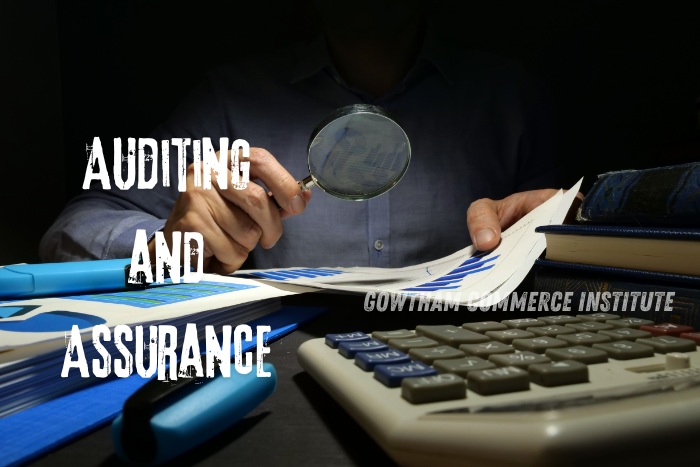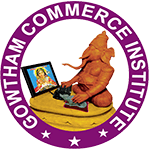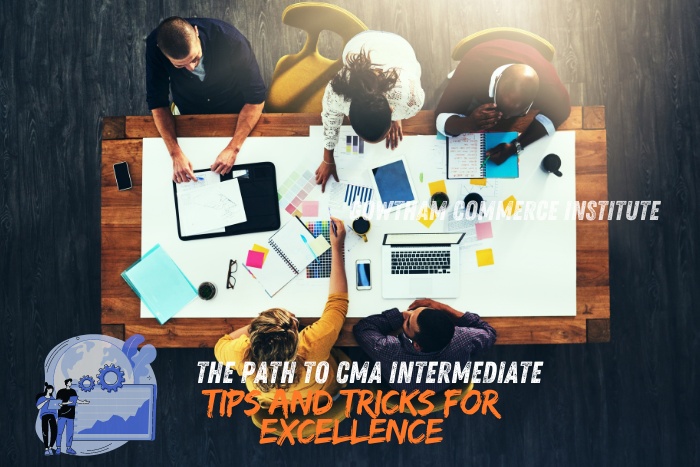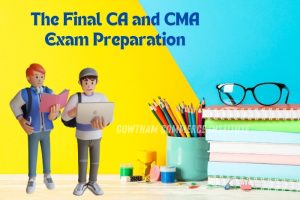Hello, would-be CMAs! 🌼 You’ve come to the perfect site if you’re determined to ace the CMA Intermediate examinations. Getting certified as a management accountant is a difficult but very rewarding path. Our goal at Peelamedu, Coimbatore’s Gowtham Commerce Institute is to support you in achieving success on your CMA Intermediate tests. This book is full with useful hints and techniques to help you succeed.
Understanding the CMA Intermediate Exam
The CMA Intermediate exam is a critical milestone in your CMA journey. It comprises two groups, each with four papers:
Group I
- Financial Accounting
- Laws, Ethics, and Governance
- Cost Accounting and Financial Management
- Taxation
Group II
- Advanced Accounting
- Auditing and Assurance
- Management Information Systems and Strategic Management
- Financial Management and Economics for Finance
Each paper demands a thorough understanding of concepts, practical application, and strategic preparation. Here’s how you can navigate this path successfully.

Effective Study Strategies
1. Craft a Solid Study Plan
Why it works: A well-structured study plan ensures you cover the entire syllabus methodically and within the available time frame.
How to do it:
- Break Down the Syllabus: Divide the syllabus into smaller, manageable sections.
- Allocate Time Slots: Dedicate specific time slots for each subject and stick to your schedule.
- Set Milestones: Establish weekly and monthly goals to keep track of your progress.
- Include Breaks: Regular short breaks can enhance productivity and prevent burnout.
2. Deep Dive into Concepts
Why it works: A deep understanding of concepts helps in answering application-based questions effectively.
How to do it:
- Use Multiple Resources: Refer to ICAI study materials, reference books, and credible online sources.
- Interactive Learning: Engage in study groups or coaching classes to discuss and clarify doubts.
- Practical Application: Regularly practice problems to apply theoretical knowledge.
3. Consistent Revision
Why it works: Regular revision reinforces memory and ensures you retain information longer.
How to do it:
- Weekly Reviews: Schedule weekly review sessions to go over what you’ve learned.
- Summary Notes: Create concise notes summarizing key points for quick revision.
- Visual Aids: Use charts and diagrams to simplify and remember complex concepts.
4. Practice with Past Papers and Mock Tests
Why it works: Practicing with past papers and mock tests familiarizes you with the exam format and improves time management skills.
How to do it:
- Simulate Exam Conditions: Take mock tests under timed conditions.
- Analyze Your Performance: Review your answers to identify strengths and weaknesses.
- Focus on Weak Areas: Dedicate extra time to subjects or topics where you need improvement.

5. Enroll in a Reputable Coaching Institute
Why it works: Expert guidance and structured coaching can significantly enhance your preparation.
How to do it:
- Join Gowtham Commerce Institute: Benefit from our experienced faculty and personalized coaching approach.
- Regular Classes: Attend classes regularly and participate actively in doubt-clearing sessions.
- Utilize Study Materials: Make the most of the comprehensive study materials provided.
Subject-Wise Tips and Tricks
Financial Accounting
- Master Basics: Ensure a strong grasp of fundamental accounting principles.
- Practice Regularly: Regularly solve accounting problems to build proficiency.
- Stay Updated: Keep up with any changes in accounting standards.
Laws, Ethics, and Governance
- Understand the Laws: Thoroughly read and understand all laws covered in the syllabus.
- Use Mnemonics: Create mnemonic devices to remember key legal provisions.
- Case Studies: Analyze past case studies to understand the application of laws.
Cost Accounting and Financial Management
- Conceptual Clarity: Focus on understanding the concepts rather than rote learning.
- Numerical Practice: Regularly solve numerical problems to improve accuracy.
- Visual Aids: Use graphs and charts to better understand cost behavior and analysis.
Taxation
- Stay Updated: Keep abreast of the latest tax laws and amendments.
- Practice Calculations: Regularly work on tax calculations to ensure accuracy.
- Real-Life Scenarios: Apply theoretical knowledge to real-life scenarios for better understanding.
Advanced Accounting
- Master Advanced Topics: Focus on mastering advanced accounting topics and standards.
- Regular Practice: Regular practice of advanced problems is crucial.
- Seek Clarifications: Don’t hesitate to seek help for complex topics.
Auditing and Assurance
- Understand Auditing Standards: Familiarize yourself with all auditing standards.
- Focus on Procedures: Pay attention to different auditing procedures and techniques.
- Case Analysis: Study past audit cases to understand practical applications.
Management Information Systems and Strategic Management
- Focus on IT Systems: Understand the role and functioning of various enterprise information systems.
- Strategic Thinking: Develop strategic thinking skills through case studies and real-life examples.
- Interactive Learning: Participate in group discussions and interactive sessions.

Financial Management and Economics for Finance
- Master Financial Concepts: Focus on mastering key financial management concepts.
- Numerical Practice: Regularly practice numerical problems to improve speed and accuracy.
- Stay Informed: Keep yourself informed about the latest economic trends and policies.
Conclusion
It takes a combination of methodical preparation, persistent work, and professional coaching to succeed in your CMA Intermediate tests. You may improve your readiness and raise your chances of success by paying attention to these tried-and-true advice and techniques. We at Gowtham Commerce Institute in Peelamedu, Coimbatore, are dedicated to giving you the tools and assistance you need to succeed. Come along and start along the path to a prosperous career as a CMA!





